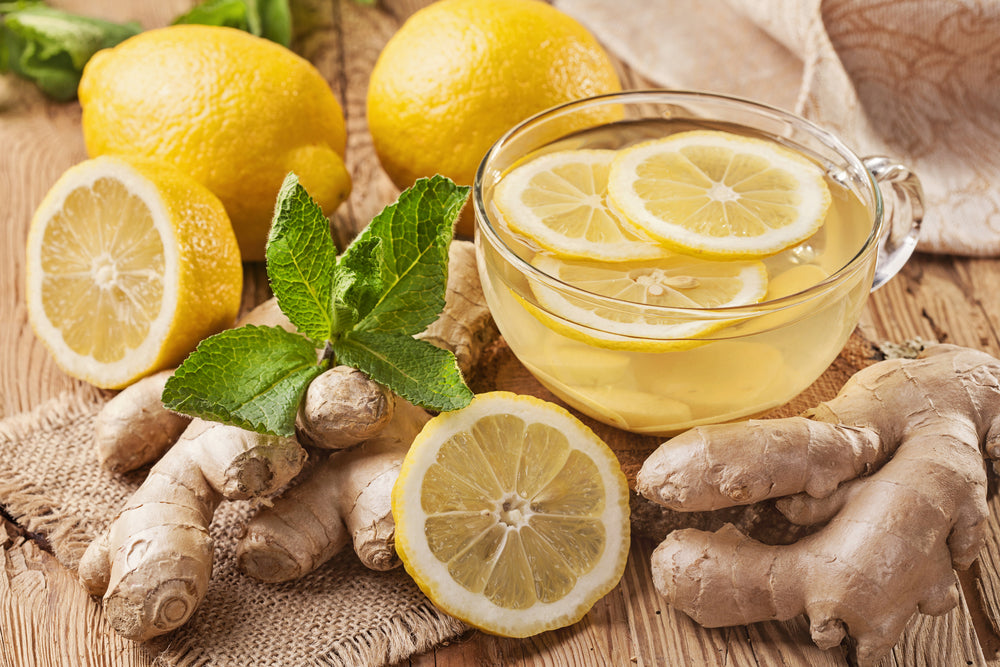Add description, images, menus and links to your mega menu
A column with no settings can be used as a spacer
Link to your collections, sales and even external links
Add up to five columns
Add description, images, menus and links to your mega menu
A column with no settings can be used as a spacer
Link to your collections, sales and even external links
Add up to five columns

Lemon Ginger Tea: History and Health Benefits
December 07, 2023 3 min read
Lemon Ginger Tea: History and Health Benefits
In the realm of herbal infusions, lemon ginger tea holds a prominent position, revered for its invigorating aroma, zesty flavor, and a wealth of potential health benefits. This harmonious blend of ginger's spicy warmth and lemon's refreshing tang has captivated taste buds and intrigued wellness enthusiasts for centuries. Let's embark on a journey to uncover the rich history and therapeutic properties of this delightful beverage.
Tracing the Origins of Lemon Ginger Tea
The roots of lemon ginger tea can be traced back to ancient civilizations, where both ginger and lemon were prized for their culinary and medicinal properties. Ginger, with its pungent aroma and fiery flavor, was cultivated in India and China as early as 5000 BC. It was revered not only for its culinary versatility but also for its purported ability to alleviate various ailments such as nausea, indigestion, and inflammation.
Lemon, with its bright citrusy flavor and rich vitamin C content, was also highly valued in ancient cultures. In the Mediterranean region, lemons were cultivated as early as the 7th century BC and were believed to possess medicinal properties for treating a variety of conditions, including scurvy and respiratory infections.
The combination of ginger and lemon, in the form of a tea, emerged as a popular beverage in various cultures. In India, ginger tea, known as Adrak ki chai, became a staple in Ayurvedic medicine, believed to promote digestion, boost immunity, and alleviate various ailments. Similarly, in China, ginger lemon tea was consumed for its warming properties and its ability to soothe sore throats and coughs.
The Global Spread of Lemon Ginger Tea
As trade routes expanded and cultural exchanges flourished, lemon ginger tea gained popularity worldwide. European explorers, encountering lemon and ginger in their travels, brought these ingredients back to their homelands, where they were embraced for their culinary and medicinal uses.
In the 19th century, the rise of holistic health practices and a growing interest in herbal remedies further propelled the popularity of lemon ginger tea. Health enthusiasts and alternative medicine practitioners advocated for its purported benefits, including boosting the immune system, easing digestive issues, and reducing inflammation.
Lemon Ginger Tea: A Symphony of Flavors and Potential Health Benefits
The captivating flavor of lemon ginger tea is a harmonious blend of ginger's spicy warmth and lemon's refreshing tang. The spiciness of ginger is tempered by the zesty citrus notes of lemon, creating a well-balanced and invigorating infusion.
Beyond its delightful taste, lemon ginger tea is also associated with a range of potential health benefits. While more research is needed to substantiate some of these claims, the available evidence suggests that lemon ginger tea may offer various wellness advantages.
Potential Health Benefits of Lemon Ginger Tea
- Digestive Support: Ginger has been traditionally used to aid digestion, and some studies suggest that it may help relieve symptoms of indigestion, nausea, and bloating.
- Immune System Support: Both ginger and lemon are rich in antioxidants, which may help protect the body from oxidative stress and support the immune system.
- Anti-inflammatory Properties: Ginger contains compounds with anti-inflammatory properties, which may help reduce inflammation associated with various conditions such as arthritis and muscle pain.
- Hydration and Detoxification: Lemon ginger tea can help increase fluid intake, promoting hydration and supporting the body's natural detoxification processes.
- Nausea Relief: Studies suggest that ginger may be effective in alleviating nausea, particularly in pregnant women and those undergoing chemotherapy.
Enjoying Lemon Ginger Tea: Preparation and Tips
Lemon ginger tea can be prepared using fresh or dried ginger and lemon wedges or juice. The preparation process is simple and can be customized to suit individual preferences.
Ingredients:
- Fresh or dried ginger root
- Lemon wedges or juice
- Honey or sweetener (optional)
Preparation:
- Peel and thinly slice fresh ginger root or use 1-2 teaspoons of dried ginger.
- Heat water to a boil and add the sliced ginger or dried ginger.
- Allow the ginger to steep for 5-10 minutes, depending on the desired intensity.
- Strain the ginger tea and add lemon wedges or juice to taste.
- Sweeten with honey or other sweetener if desired.
Tips:
- For a stronger flavor, increase the amount of ginger or steep for a longer period.
- Add a pinch of black pepper to enhance the absorption of ginger's beneficial compounds.
- For a soothing touch, add a teaspoon of honey or maple syrup.
- Experiment with different combinations of lemon and ginger to find your perfect balance.
A Timeless Infusion for Wellness
Lemon ginger tea has transcended the boundaries of time and culture, remaining a beloved beverage for centuries. Its captivating flavor, coupled with its potential health benefits, has cemented its place as a timeless infusion for wellness. Whether enjoyed as a soothing remedy or a revitalizing refreshment.
Rooibus Tea: A Comprehensive Guide
How Lipton Tea Built and Empire
Health Benefits of Pomegranate Green Tea
Subscribe
Sign up to get the latest on sales, new releases and more …
